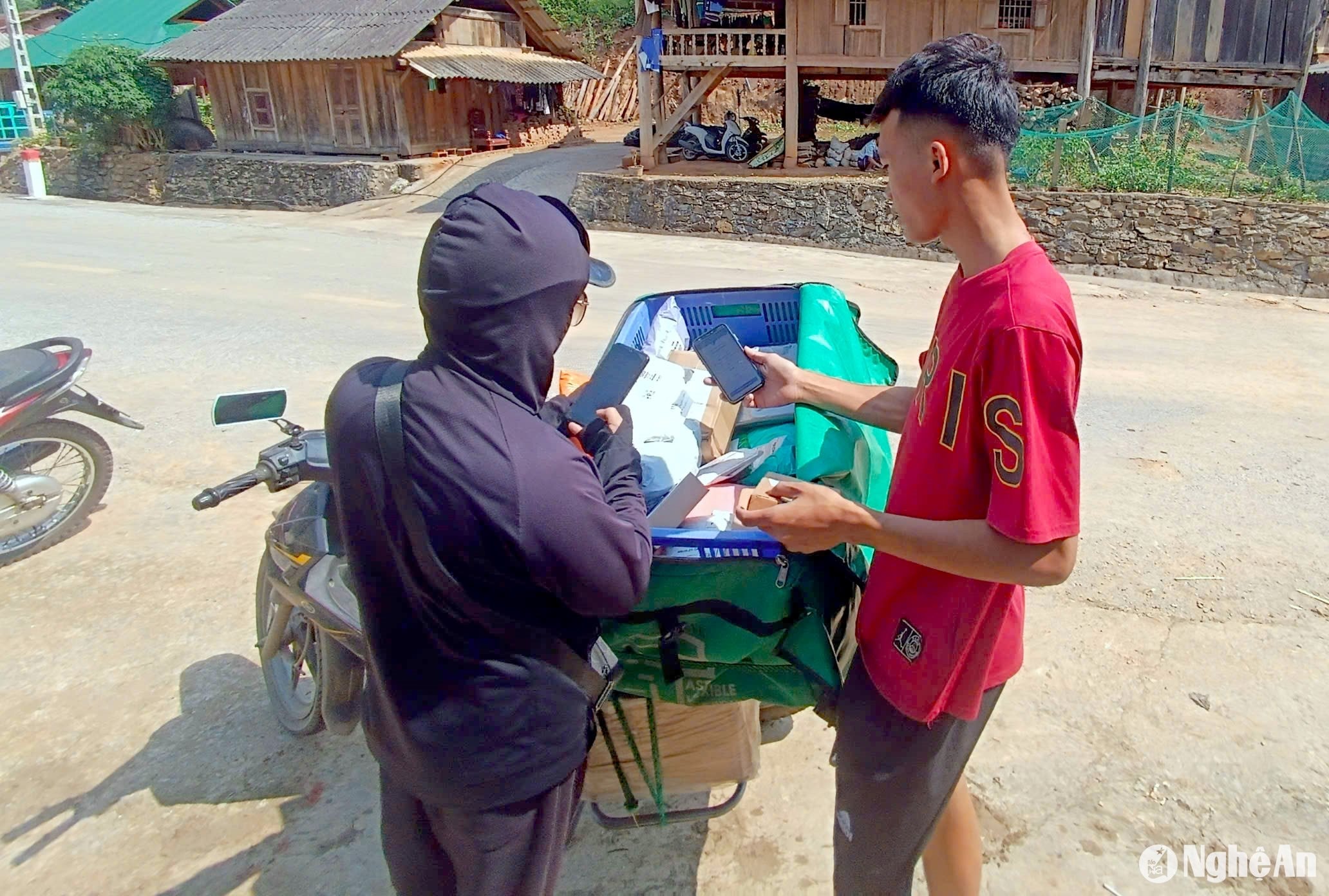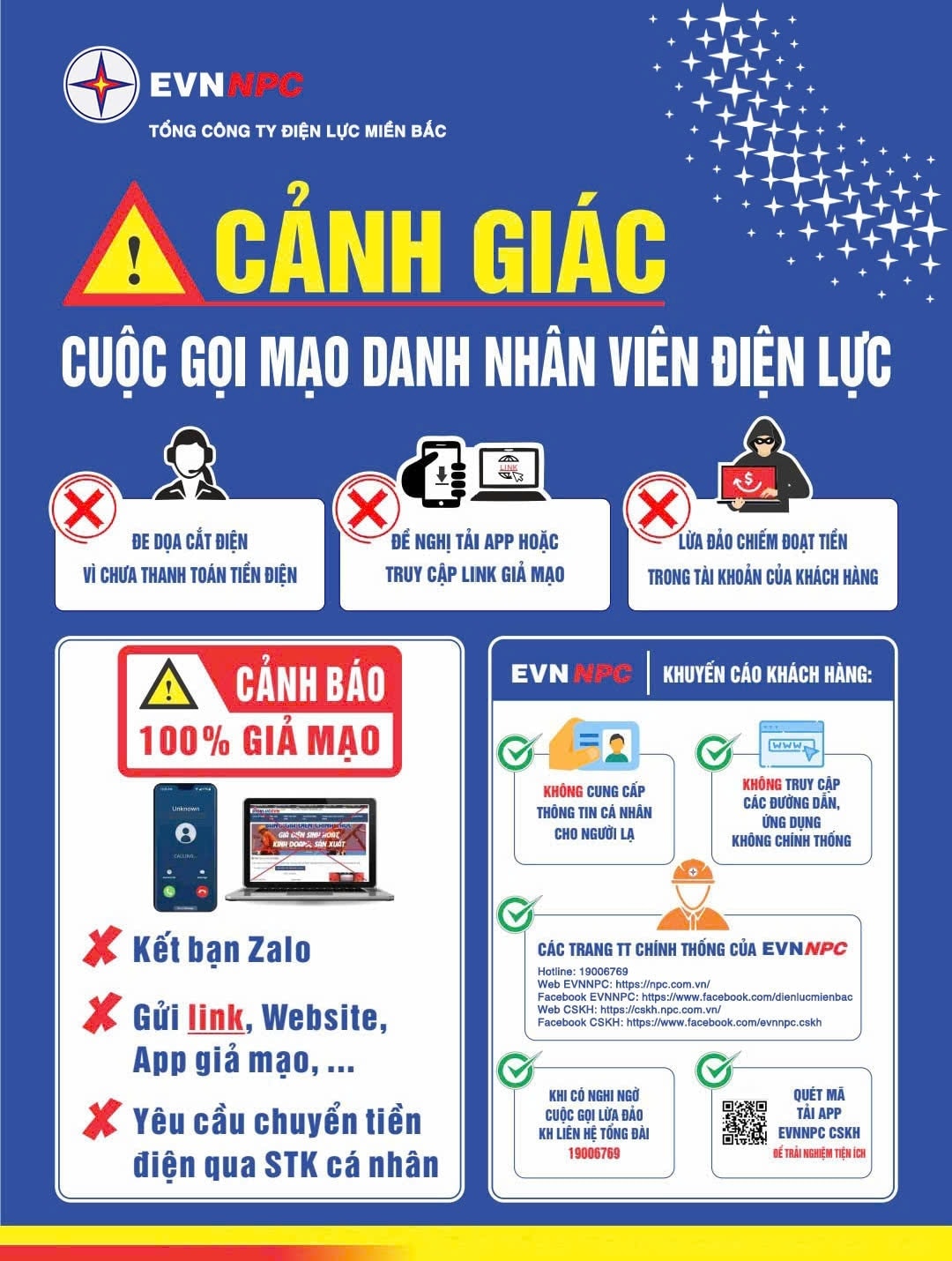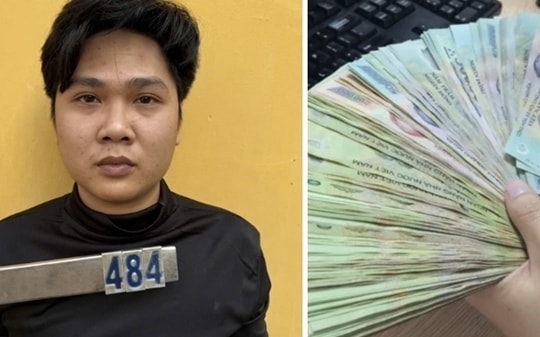Warning about all kinds of scams that trap many people
Although the authorities have repeatedly warned, many people are still falling into the traps of criminals. It is worth mentioning that there are tricks and methods that are not new, but there are still cases where people are not vigilant and are deceived and their property is taken away...
Tfake money order
At 8:00 a.m. on March 12, 2025, Hung Nguyen Town Police, Hung Nguyen District received a complaint from Ms. TTC (born 2006), residing in Van Yen District, Yen Bai Province; temporarily residing in Hung Nguyen Town, about being defrauded by a subject who appropriated property by creating fake money transfer payment slips to appropriate 10 million VND.
Only 3 hours after receiving the report, after zoning and checking, Hung Nguyen town police summoned Nguyen Quang Chinh (born 2001), residing in Gia Hanh commune, Can Loc district, Ha Tinh province - a suspect - to the headquarters to fight.

At the police station, Chinh was stubborn and tried to deny his crime. However, with the documents and evidence collected by the investigators, he admitted to the crime. Chinh said that he and Ms. C. had known each other before.
Due to laziness and lack of a stable job, the subject came up with the idea of defrauding Ms. C. by using a phone application to create a fake payment slip for transferring 10 million VND from another account to Ms. C.'s account and showing it to her. After that, Chinh asked Ms. C. to transfer the above amount back to Chinh. The subject used all of the above amount for spending.

Currently, the Investigation Police Agency of Nghe An Province Police has initiated a case and prosecuted Nguyen Quang Chinh for fraud and property appropriation.
Previously, in October 2024, Ho Tran Quoc Khanh (born 2003, in Yen Thanh district, Nghe An) was also prosecuted for a similar crime. According to the police of Bac Tu Liem district (Hanoi), Khanh was a student at a university in Hanoi. Because she discovered that the delivery person in this area for the S e-commerce platform, Ms. Pham Thi H., had the habit of only looking at the successful transfer notification on the customer's phone, without checking whether her account had received the money or not.
Khanh came up with the idea of fraud by faking the image of a successful transfer confirmation on the banking application to appropriate money.
.jpg)
Accordingly, Khanh ordered a Xiaomi 14 T Pro phone from the S e-commerce platform. Then, he asked someone to help him take a photo confirming the successful transfer of 13,805,000 VND. Upon receiving the goods, when Ms. H. gave the QR code to scan the transfer, Khanh pretended to scan the payment code with his phone and opened the fake successful transfer photo that he had previously shown to Ms. H. and took the phone away. About 20 minutes later, seeing no transaction of Khanh transferring money, Ms. H. went to the police station to report the incident.
Mohshipper name, shop owner tricked people into transferring money in advance
In addition to the trick of creating fake payment receipts, recently, taking advantage of online shopping and cashless payment services, many subjects have impersonated shippers and delivery staff of shipping and express delivery units to commit fraud.
Accordingly, the scammers collect information of customers who order products from public comments or buy customer information through various information channels. Then, they pretend to be delivery people to call for delivery during business hours or when the customer is not at home.

If the listener says they cannot receive the goods, the scammers will ask them to transfer payment for the order to send the goods to acquaintances, neighbors, etc. After receiving the money, they continue to use many reasons such as texting the wrong payment account, then trick the victim into clicking on a link containing "malicious code" to take control of the device and take over the victim's bank account, take over the victim's money, and then cut off contact.
In addition, Ms. KN - owner of a shop specializing in selling Japanese domestic products and sports and fitness products on Nguyen Thi Minh Khai Street (Vinh City) said: There was a case where a customer closed an order on her personal page and a bad guy set up zalo to impersonate the shop owner and made friends to close the order, tricked her into transferring money in advance to the subject's account to steal the customer's money, causing her to have to speak up to warn on Facebook.
Impersonating an electricity employee
Another trick that other subjects have recently used is to impersonate electricity employees to call customers to inform them that they owe electricity bills and threaten to cut off the power if they do not pay immediately. Then, they ask people to transfer money to a personal account or provide bank information to "settle the debt".

In addition, the subject also sends fake SMS messages or emails announcing electricity bills, along with links to online payments or fake applications. If the victim clicks on the link and fills in the information, the scammer will steal credit card or bank account information.
Typically, on February 16, 2025, the Department of Cyber Security and High-Tech Crime Prevention received a report from Ms. PTH residing in Nghi Huong Ward, Vinh City, that at about 4:00 p.m. the same day, she received a call from a strange phone number claiming to be an electricity employee informing her family that she owed electricity bills.
Through the Zalo application, the subjects sent a link asking Ms. H. to install the Epoint application (a fake application containing malicious code that takes control of the device) on her mobile phone. Because the subjects continuously urged and threatened to cut off the electricity, Ms. H. complied with their requests.
After performing some operations on the application, the subjects continued to ask Ms. H. to access the A. bank application and use her citizen identification to complete the payment process.
The subjects also sent a sophisticatedly designed QR code for payment with the logo of EVN Electricity Corporation. Immediately after that, 92 million VND and more than 600 million VND were automatically deducted from Ms. H's two bank A payment accounts.

The Cyber Security and High-Tech Crime Prevention Department instructed Ms. H. to perform operations on the phone to prevent the money from being transferred; at the same time, instructed Ms. H. to report directly to the Bank to promptly freeze the above amount of money. It is worth mentioning that at that time, the subjects discovered that Ms. H. still had an online savings book in her account, so they continued to carry out tricks to appropriate this amount of money.
However, the police officers promptly removed the malware, instructed Ms. H. to install security on her bank account, and prevented the above-mentioned subjects from committing fraud. By the morning of February 17, 2025, Ms. H. had received back nearly 700 million VND.

Cut and paste sensitive images and videos for blackmail
Currently, the Ministry of Public Security has also continuously issued warnings about the situation of criminals taking advantage of images and videos of people publicly available on the Internet to edit, cut and paste to create sensitive content to threaten and blackmail. Accordingly, criminals target victims who are people with economic conditions, social status, officials and civil servants in the political system.
.jpg)
The Ministry of Public Security recommends that people be vigilant when receiving messages or calls with the above content; do not transfer money when threatened; when detecting signs of fraud or property extortion, quickly report to the nearest police agency and report via the VneID application.
Proactive prevention
In Nghe An, in the face of the complicated situation of property fraud crimes, especially high-tech property fraud crimes that affect security and order. In recent times, in addition to coordinating with departments and organizations to promote propaganda and warnings in many forms, gradually building a people's security posture in cyberspace; the authorities have synchronously deployed preventive measures and combated property fraud crimes, especially high-tech fraud.
At the same time, strengthen State management, thereby discovering causes, conditions, methods and tricks to have effective measures to combat this type of crime.

In February 2025 alone, the functional forces in the province discovered 5 cases, 18 subjects using high technology, including 2 cases, 3 subjects fraudulently appropriating property.
However, besides the involvement of the functional sector, the most important thing is still the vigilance of the people. Therefore, the functional forces and related sectors recommend that people absolutely do not follow instructions, do not make money transfers to strangers. Do not provide sensitive personal information in any form. Do not access payment links from messages or emails of unknown origin; absolutely do not share ID card, bank account number, OTP code, password... with people who do not know or cannot verify their background.
In case of suspicion of being scammed, people need to immediately report to the authorities for support.


.jpg)


.jpg)

